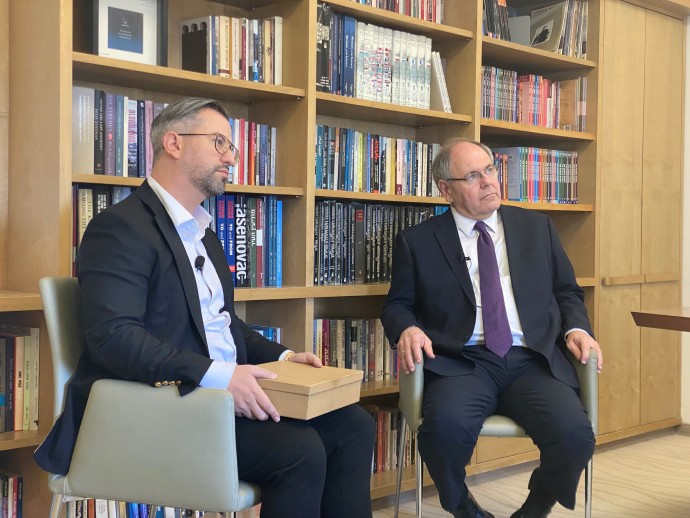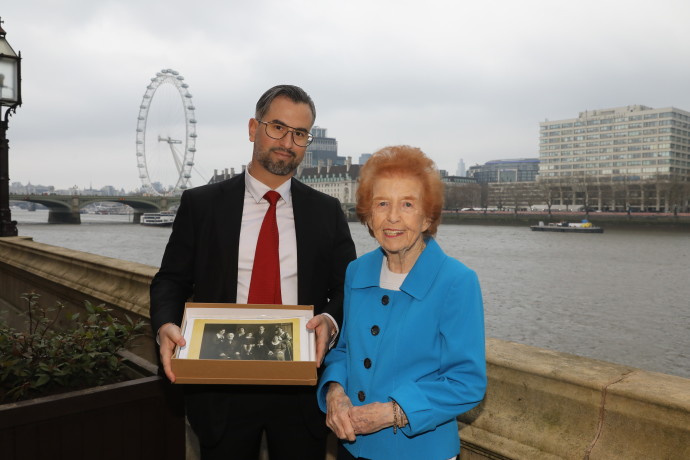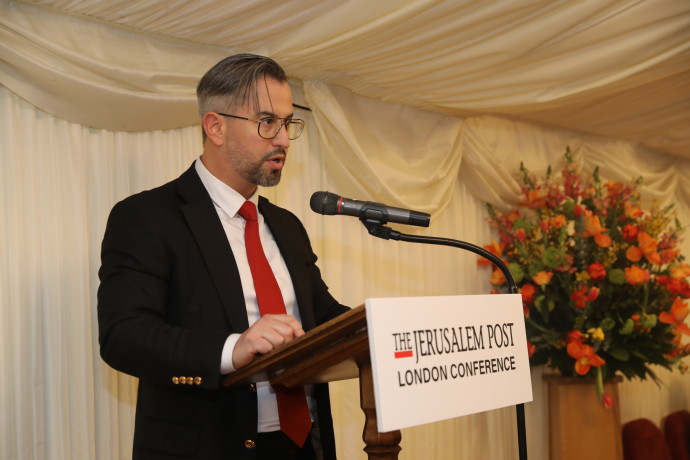Eitan Neishlos is a young man with a heavy burden. But it is a burden he proudly carries.
As the grandchild of a Holocaust survivor, the Israeli-born, South Africa-raised philanthropist and entrepreneur has chosen to dedicate his efforts, and that of his newly established Neishlos Foundation, to preserving the memory and advancing education about the Holocaust while promoting tolerance and coexistence, to create a young generation of “upstanders.”
“This is not just about preserving the memory of the victims or giving them a voice. It is not just about honoring the survivors. Preserving the memory of the Holocaust is vital to our ability to stand up today against antisemitism – along with all forms of hatred and discrimination,” explains Neishlos.
It is a message he made clear on a recent visit to Yad Vashem. It is a point he also headlined earlier this month at a special meeting in the British House of Lords, and it is a beacon he will carry high when he travels to Auschwitz on Holocaust Remembrance Day with the International March of the Living, leading the future generation campaign at this year’s march, as it reconvenes after a two-year hiatus due to COVID. Moreover, it is a message he will continue to promote as he looks to advance Holocaust education and the work of March of the Living as he relocates to the United Arab Emirates this month.

Last month, during an official visit to Yad Vashem – the Holocaust Martyrs’ and Heroes’ Remembrance Authority in Jerusalem, Neishlos discussed the foundation’s work and possible avenues of collaboration with Yad Vashem chairman Dani Dayan, who previously served as Israel’s consul-general to New York. Dayan and his team took
Neishlos to the coveted underground archives, where among the 130,000 documents, Dayan presented Neishlos with a booklet containing exclusive documentation on the Neishlos family’s Holocaust story, shedding further light on his own personal history, while highlighting the importance of the journey he embarked upon when launching the Neishlos Foundation in January.
The documents were added to a special shoebox Neishlos carries with him – a shoebox that tells a story of survival, tragedy, hope and faith in humanity. Neishlos and his mother found the “shoebox of memories” when clearing out his grandmother Tamara Ziserman’s home after she passed away in 2011.
Born in Belarus in 1929, as a young girl Ziserman survived the horrors of the Holocaust hidden away in a chimney by her Christian neighbors, the Chodoseviches. She survived, but her saviors were taken out and executed by the Nazis for their role in the resistance. Together with their baby, they were shot to death on the same spot that the town’s Jews were gunned down in cold blood. The Neishlos family made sure that the Chodoseviches would be honored as Righteous Among Nations by the State of Israel. Neishlos visited their names engraved on the walls of the Garden of the Righteous during his visit to Yad Vashem.
Their memory is also important to me,” explains Neishlos. “When we talk about keeping the memory of the Holocaust alive, we must tell the whole story. It is not enough to be passive and just say ‘Never Again’ and light a candle on Yom Hashoah. This generation must strive to preserve the memory of the Holocaust for the sake of humanity.”
He adds, “I feel as though she left us this box of her memories, her voice, and it is my duty and my privilege to tell her story, and the stories of all survivors, to future generations, to keep the torch of memory alive. She didn’t talk much about her experiences during the war. I think it was too traumatic for her – and it wasn’t what she wanted her life to be about. But she understood that the memory must be preserved.”
At last month’s Jerusalem Post London Conference, at a special reception at the House of Lords, Neishlos spoke alongside Eve Kugler, a 91-year-old Holocaust survivor who has led the charge in recent years to tell the story of the victims. Handing the torch of memory to Neishlos, Kugler said that this year would likely be her last March of the Living visit to Auschwitz.
She spoke of her anguish that the lessons of the past had yet to be learned.
“The shadow of war in Europe was palpable in the room,” said Neishlos. “There is no comparing the crimes and the vast scale of the Holocaust to what we are seeing now in Europe, but the echoes are undeniable, and frankly, human suffering is not a competition.

“This all just reinforces the need for Holocaust remembrance – not just for the sake of the past, but also the future. With Holocaust denial and historical revisionism rampant, there simply isn’t time to sit back. With the passing of the torch to the third generation, there is an opportunity to make a truly global impact.”
Neishlos was not alone in representing the third generation of Holocaust remembrance in London. He was joined by Carolin Hohnecker, a third-generation to Nazi SS officers, whose family’s story during World War II could not have been more different.
Hohnecker bravely explained how at age 24, she discovered that her grandparents were members of Hitler’s elite guard and had an active role as concentration camp guards. She spoke emotionally, during the future generation panel headed by Neishlos, of the importance she attached to coming to terms with the crimes of her families’ past and ensuring that “never again” was more than an empty promise.
It is this emphasis on the significance of the past as a lesson for the future and as a reminder of the need to stand up for what is right, that Neishlos stresses. “Holocaust education is central to what we do,” he explains, “but across a range of issues and focuses, we are investing in campaigns to create global impact and sustainable annuity charitable income. The Neishlos Foundation is standing up for Israel and fighting antisemitism, but also coming with a universal message that this generation cannot be one of bystanders.
“We must stand up for tolerance and understanding; and stand up against hatred and prejudice. Everywhere.”
As he reflects on leading this year’s March of the Living to Auschwitz on behalf of the future generation, Neishlos talks about his desire to continue fighting prejudice in all its forms, as he has done in Australia through his leadership of Courage to Care. This B’nai B’rith program educates Australians on an incredible scale about the dangers of prejudice, racism, and discrimination. Neishlos, former chairman of the organization, who now serves as its ambassador-at-large, led the organization, which educates about the Holocaust and encourages young adults to become “upstanders” – to call out and combat racism, antisemitism and all forms of bigotry.

Courage to Care takes mobile exhibits about the Holocaust throughout Australia and arranges for Holocaust survivors to speak to attendees. More than 200,000 young adults – from all religious denominations – have attended its unforgettable workshops and seminars.
With an eye on his new life and role in the UAE, and looking to the Middle East in general, Neishlos is keen to point to the importance of the Abraham Accords. “People talk about the new Middle East, but the impact is felt far beyond,” he says. “While in London, I met a Moroccan who was so happy to hear I had come from Israel. ‘We have peace now,’ he excitedly told me.”
This enthusiasm has become typical, he feels, and Neishlos wants to extend his vision of educating the third generation to become upstanders to the Arab countries that signed the Abraham Accords in 2020 – the UAE, Bahrain, Morocco and Sudan. This process will have significant ripples in countries around the world, especially where Jewish and Muslim communities live side by side.
“We can preach to our own people, and we must,” notes Neishlos, “but our Arab friends want to embrace us.” The Neishlos Foundation, he discloses, will soon be working in those countries to identify future leaders to embrace the peace outlined in the Abraham Accords as well as the ideas of fighting hatred and antisemitism. “The common theme of all these projects is to embrace the third generation of young leadership. Some will emphasize Holocaust remembrance, and others will emphasize political peace.”
As our interview draws to a close, Neishlos again mentions the recently discovered shoebox, which contained his grandmother’s memoirs detailing her experiences growing up as a child in Belarus during the Holocaust. He shares that in the last month, he has learned even more about his grandmother’s life and recently located a videotape interview in which she disclosed more information about her life under the Nazi occupation.
In that spirit, he urges anyone who has living relatives who survived the Holocaust to speak with them and learn of their experiences. “You need to get involved and ‘shake the tree’ and find out the details to build a story,” he says.
He points out that campaigns supporting Israel and fighting antisemitism must be conducted in new and innovative ways, partnering with other innovative organizations. It is thus no surprise that Neishlos and his foundation are leading the way in bringing together – for the first time in such a forum, and on such a stage as the House of Lords, and soon at Auschwitz itself – the descendants of survivors, Nazis and even Righteous Among the Nations, all together. In this spirit of reconciliation and understanding, we all share the burden in keeping the memory of the past alive, and ensuring its lessons are learned for future generations.
Ultimately, he suggests, “The way we are going to achieve maximum impact is to deliver a powerful message through creative and out-of-the-box methods.”
This article was written in cooperation with the Neishlos Foundation.
